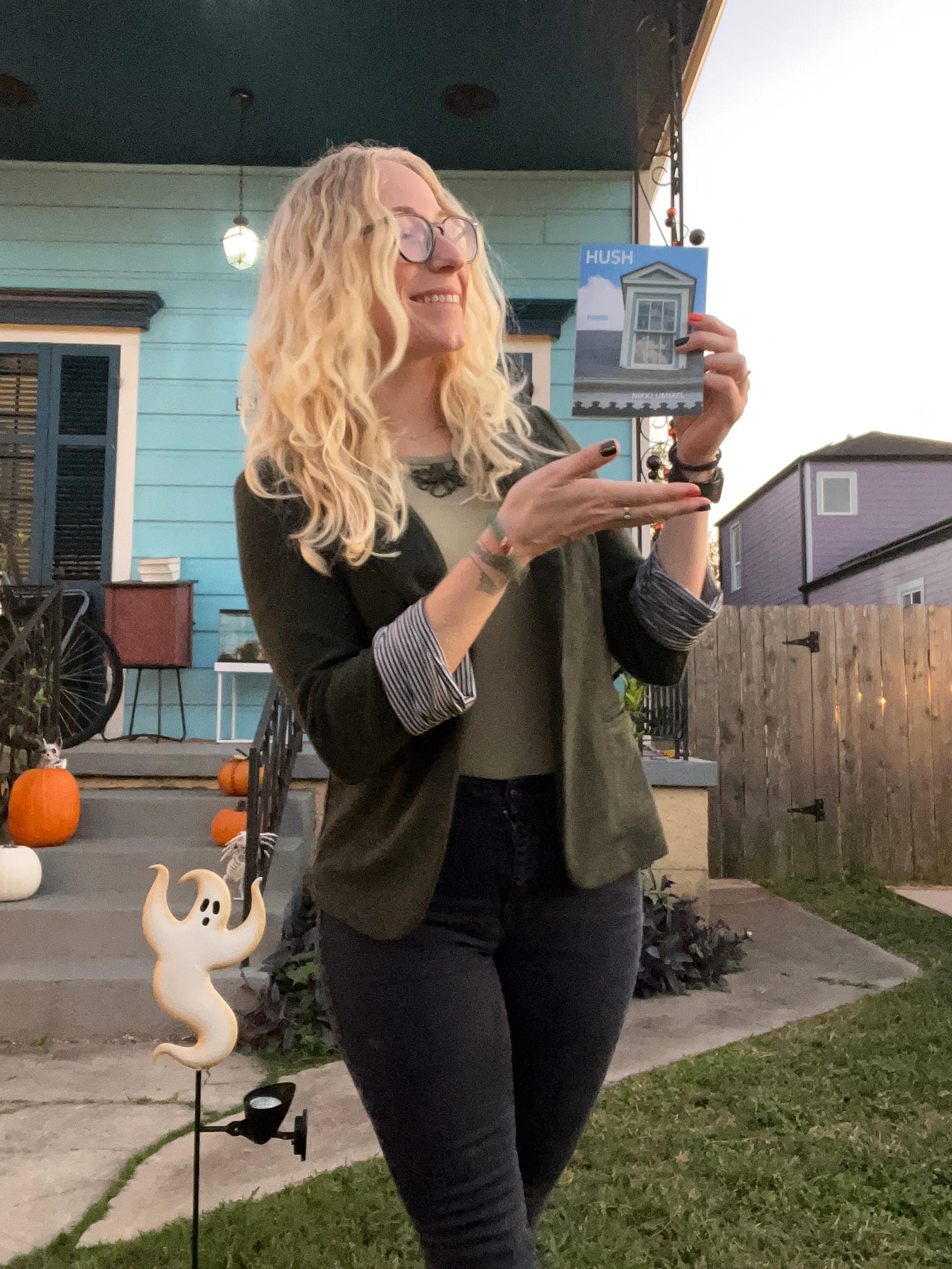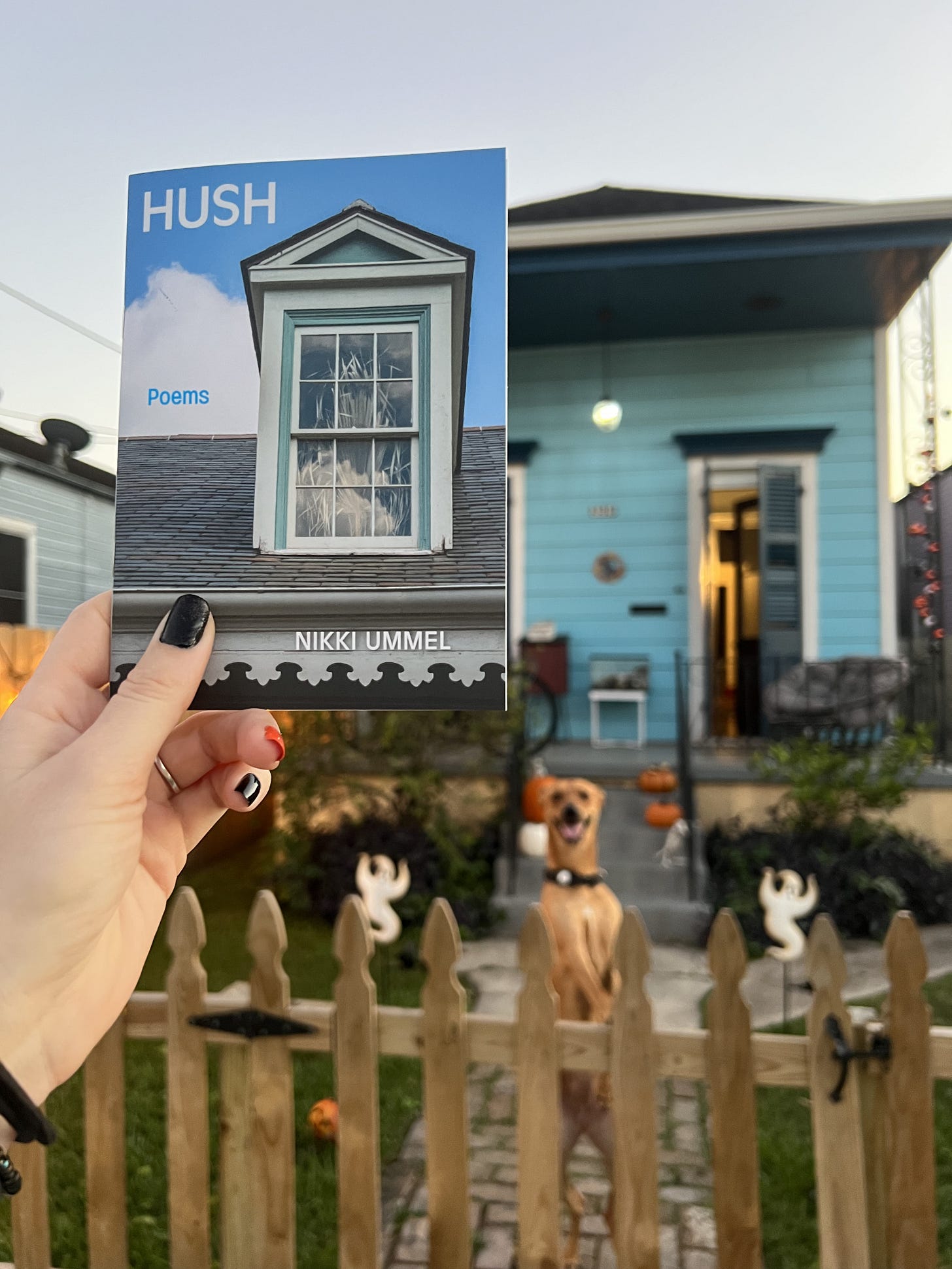I’m so glad that Nikki Ummel found us during our chapbook reading period last spring. Beyond having a deep, abiding love for all things New Orleans, I’m especially drawn to work that explores family relationships, so Nikki’s poetry is a perfect fit for our vision as a press. Read on below to learn more about Nikki and how she understands her place in the literary community.
About the Author:
Nikki Ummel is a queer writer, editor, and educator in New Orleans. Nikki's work has been published or is forthcoming in Painted Bride Quarterly, The Adroit Journal, The Georgia Review, and more. She has been nominated for a Pushcart Prize, Best New Poets, and twice awarded an Academy of American Poets Award. She is the 2022 winner of the Leslie McGrath Poetry Prize. You can find her on the web at www.nikkiummel.com or in person wandering around Holy Cross with her beautiful dog and equally beautiful partner.
About Hush:
Inside these pages, Nikki Ummel leads us into a quiet corner. Intimacy takes on many forms as she considers the weight of being responsible for those she loves. Whether confronting the reality of a sick sister, recalling traumatic experiences, or wandering the streets of New Orleans, Hush hums with a tenderness that stays with you long after the lights go out.
Officially out on October 25, you can order yours here now.
These poems are often so intimate, yet they remain accessible to readers looking from the outside in. How do you find ways to reach that balance?
I’ve been told before that my poems operate on multiple levels, and I think, as far as bridging intimacy/personal experience and accessibility/universal experience, that’s probably true. These poems, while based in my own lived experience, deal with human emotions, situations, and relationships. Maybe the reader hasn’t lost a loved one, but they probably know what loneliness feels like, or have walked with the fear of losing those that matter most. I think often, as poets, we allow our writing to be a form of therapy. And that’s okay, sometimes. But in order to reach out, to expand beyond our own experience, to engage others and ask them to grapple, we must become less insular and move away from individual therapy and towards connection. That’s what draws me to poetry, anyway. Being reminded I’m human, and so is everyone around me, and we’re all in this messy existence together, and we need each other.
It sounds like many of these poems are autobiographical and refer to your real family relationships. What is it like to share that vulnerability? How do your family members respond to that level of openness?
One of the first poems I remember writing was a poem about the dangers of smoking cigarettes. I wrote it down and gave it to my dad, then memorized and chanted it whenever I could. He hated it, which is totally understandable, but I needed him to know about, and for us to connect, over my fears. For me, writing has always been my way out of the dark. When I feel overwhelmed, I write. That is my first poetic impulse, though I’ve been focusing on expanding my “tool kit,” so to speak. And while many of these poems are born from lived experience, they don’t always stay there—once on the page, these poems become their own beings, and I don’t allow the “truth” to outweigh the poem’s impulses. That is to say, sometimes what the poem is doing is more interesting than the circumstances that birthed it. And who am I to stop the poem from doing what it is called to do? I have yet to receive pushback from my family on my work, though I’ve been bracing for it. I think they probably just roll their eyes and say, “There goes Nikki again.” I’m the middle child. I’m used to it.
You’re now a New Orleans poet, but you’re not from there originally, right? How do you see the city’s role in your sense of yourself as a poet, and how has it affected your poetics?
New Orleans is a city brimming with life. It seeps out of the edges and explodes in the streets. The art scene is the same, though it looks different from other cities: most creative communities here meet for the celebration of the thing itself, not for recognition or renown, but for connection. One might say, “art for art’s sake,” but that’s not quite it. It’s more like “art for community’s sake,” and for the sake of the self. Any room you enter contains artists and creatives, even if what they’re creating isn’t considered “art” by ivory-towered eyebrow archers. It’s the hum that draws people to New Orleans, myself included.
Although I’ve always been a poetry scribbler, I really came to identify as a poet after moving to New Orleans. I’ve regularly joked that teaching fifth grade in a rural community in Mississippi turned me into a regular writer as a way to express that trauma. But in a way, that’s true. When I moved to New Orleans and continued teaching, I continued writing. Within a year of being here, I applied to the Creative Writing Workshop at the University of New Orleans, with the intention of pursuing an MFA for me and for my students. In fact, my application essay stated exactly that—I wanted to be a better writer so I could be a better teacher. Throughout my MFA journey, though, I realized I could do more than that. My entire life transformed over those three years, and for the first time in my life, I found a pursuit that nurtured me. I’ve never looked back.
Speaking of New Orleans, you recently began a new local venture, LMNL Lit! Tell us more about that. How did it get started, and what are your goals?
LMNL (liminal) is the baby of another local poet, Michelle Nicholson, and I. It’s a reading series, workshop series, and residency program wrapped up in one. Sponsored in part by Poets & Writers, we host free workshops twice a month, one local and one online, ranging from a variety of topics: generative cnf/poetry/fiction, revision, how to get published, branding, etc. For our reading series, we host a reading once a month at Allways Lounge where we pair an out-of-town writer with a student or writer-under-25 years old and a mid-career writer. While we intend to keep our programming accessible (all events and classes are free), we pay our readers and teachers. The goal, with LMNL, is to connect and support diverse writers within the community while also bridging local, national, and international scenes to foster dialogue and collaborations. Our tagline is “community is creating,” and “The LMNL space is where the making takes place.”
How do you see the larger New Orleans literary community, and how do you think it resonates with (or departs from) how people often understand Southern culture?
I hesitate to speak on Southern culture, for while I’ve always been below the Mason-Dixon line, I don’t think of “the South” as a monolith. There are many cultures within New Orleans, my current home, and within my previous homes in the Tampa metro area, the Mississippi Delta, and Northern Virginia. It’s always bothered me that folks from other places think they can adequately summarize such varied regions; they inadvertently express the bigotry they claim to see. The South is complicated and nuanced, as any region is, but it is also rich in diversity, beauty, and story. With equity in mind, there is much to overcome, but there is much to celebrate: resilience, neighborliness, hope. People are the reason I stay here. You’ve never seen people come together the way they do in New Orleans, to celebrate, to help. It’s incredible.
I’m really lucky I matured as a poet in a city that contains so many amazing poets and writers already.





